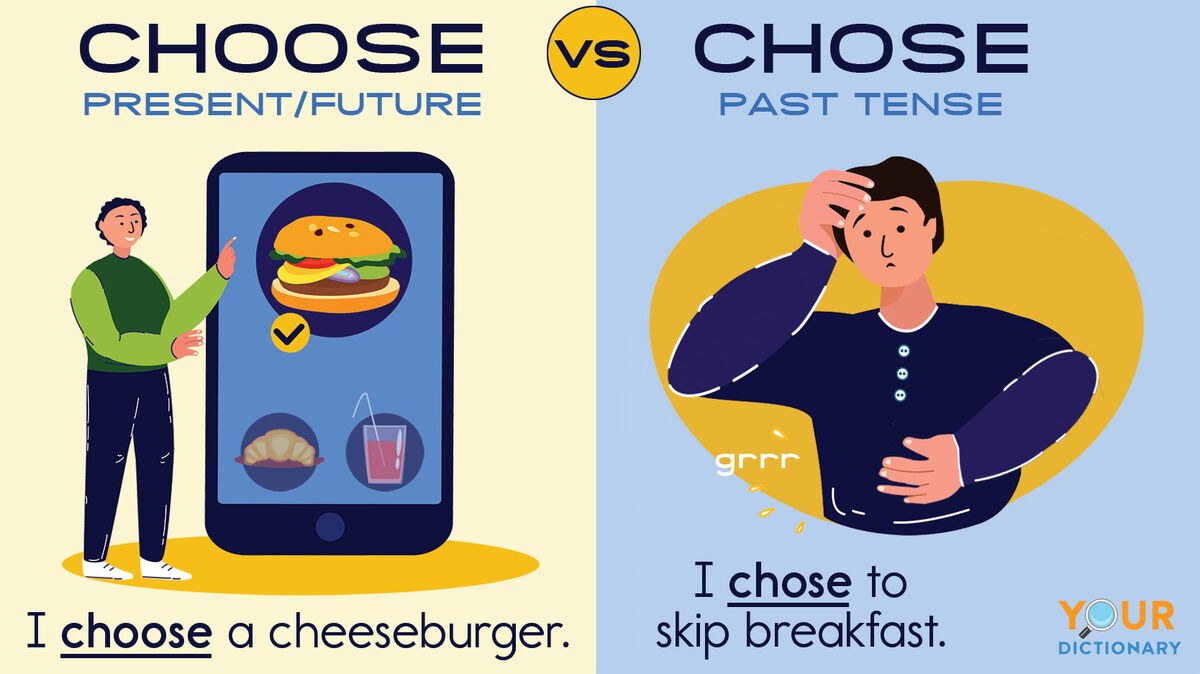
Just one letter separates choose from chose, but that single letter is an important one that affects meaning, pronunciation and tense. The words choose and chose are so closely related that they're often used incorrectly in spoken and written communication. Discover a few simple strategies to know how to know when to use choose vs. chose.
Choose: Definition and Pronunciation
The word choose means to select, pick or prefer something over something else. It is a present tense verb, referring to a choice that is being made now or will be made at some point in the future. Choose is pronounced as (cho͞oz) or (t͡ʃuːz), rhyming with blues and shoes.
Chose: Meaning and Pronunciation
The word chose refers to a selection that occurred in the past. It is a past tense verb, referring to a choice or decision that has already been made. It is pronounced as (chōz) or (tʃəʊz), rhyming with goes and toes.
Example Sentences Using Choose and Chose
Reviewing example sentences featuring each word can help clarify the appropriate usage of the term choose vs. chose.
Examples of Choose in a Sentence
The following sentences all discuss decisions that are currently in progress or that need to be made in the future. As a result, it is correct to use the present tense word choose in each of them.
- I need to choose between the blue car and the red car at the dealership.
- I'm not sure if I should choose a cheeseburger or a hot dog.
- I am going to choose to sleep longer instead of getting up early to walk before work.
- I am going to choose to stay home this weekend rather than go out.
- I can't choose between purple or green paint for my bedroom.
Examples of Chose in a Sentence
The sentences below refer to decisions or selections that have already been made. Since the choice has already been made, it is appropriate to use the past tense word chose in them.
- I already chose which dress to wear to the dance.
- I chose to skip breakfast this morning, but now I'm hungry.
- I chose to walk to the party instead of driving my car.
- I chose to order online rather than going to the store.
- I chose to cheat on my diet and order a pizza.
Tip to Remember the Difference
To help remember the difference between choose versus chose, try to remember that the shorter word refers to what has already happened in the past. The selection is over and done with, so it won't take up any more of your time. The longer version is going on now or in the future, so you'll need to spend more time on it. That's why the word is longer.
Alternate Forms of Choose and Chose
There are a few correct alternate forms of these two words. Discover when to use the correct alternative forms, as well as some incorrect forms that are sometimes used but should always be avoided.
When to Use Chose vs. Chosen
The words chose and chosen are both past tense forms of the verb choose. Chose is a simple past tense verb, while chosen is the past participle form. Combined with an auxiliary verb (like has or has), chosen is used to form the past perfect tense.
- correct: I did say that I had chosen to stay home tonight, but then I changed my mind.
- incorrect: I did say that I had chose to stay home tonight, but then I changed my mind.
Because of the auxiliary verb "had," it is necessary to use chosen vs. chose in the example above.
When to Use Choose vs. Chooses
The word chooses is a correct alternate form of choose, most often used when writing or speaking of someone in the third person. For example, if you are ordering for a friend in a restaurant, you would use chooses, though you would use choose when ordering for yourself.
- correct: I choose lemon meringue pie. He chooses key lime pie. (gesturing to your dining companion)
- incorrect: I choose lemon meringue pie. He choose key lime pie. (It would be incorrect to use with the third person reference to "he.")
When to Use Choose vs. Choosing
Choosing is the present participle of the word choose. When combined with an auxiliary verb (such as am or is), it becomes a compound verb used to is in progress at the present time and continues into the future.
- correct: I am choosing whether or not to take a Calculus class.
- incorrect: I am choose whether or not to take a Calculus class.
Incorrect Forms to Avoid
These options listed above are the only correct alternative forms of choose and chosen (expressed as a single word).
- It is never correct to use "choses," "choosen," or "chosing." Those letter combinations are not words.
- It is also not correct to add a "d" to either word. The letter combinations of "chosed" and "choosed" are not words.
More Tricky Word Differences
Now that you're clear on when to use chose vs. choose, you may want to take the time to get familiar with some other tricky word choices. There are quite a few similar word combinations in the English language that can be tough to differentiate. Start by focusing on when to use you're vs. your. Next, focus on making sense of the rules for using there, their and they're. Then, discover how learnt and learned differ. From there, you'll be ready to move on to even more commonly confused words.